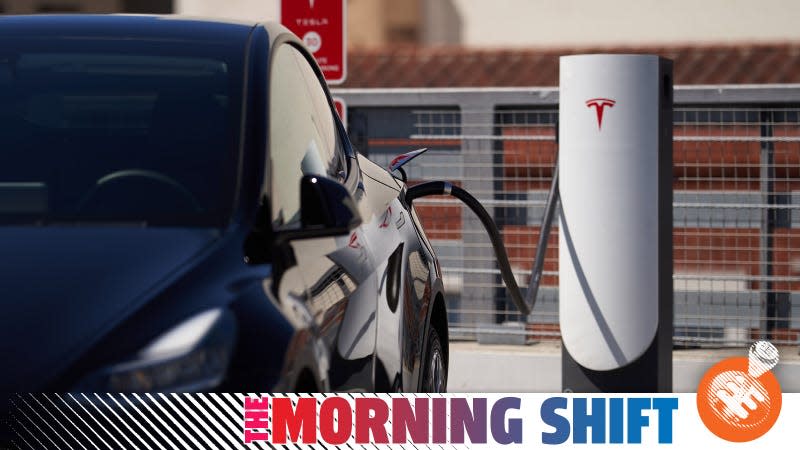South Korea Orders Tesla to Pay Millions for Overstating Range

Tesla will have to pay South Korea a little more than $2 million over alleged false advertising, the EV maker has a bona fide second-in-command behind Elon Musk now, and Hyundai and Kia have hopeful targets for the new year. All that and more in this January 3, 2023 edition of The Morning Shift.
1st Gear: Tesla Fined
South Korea’s Fair Trade Commission (KFTC) has fined the EV maker 2.85 billion won — about $2.2 million — for failing to represent the reduction in range of its cars in cold temperatures, Reuters reported Tuesday morning. According to the department, the maximum range of Tesla vehicles on a full charge can drop by as much as 50.5 percent in such conditions, which is roughly 10 percent more than most EVs on average according to data from the country’s environment ministry. From Reuters:
Read more
The Korea Fair Trade Commission (KFTC) said that Tesla had exaggerated the “driving ranges of its cars on a single charge, their fuel cost-effectiveness compared to gasoline vehicles as well as the performance of its Superchargers” on its official local website since August 2019 until recently.
[...]
On its website, Tesla provides winter driving tips, such as pre-conditioning vehicles with external power sources, and using its updated Energy app to monitor energy consumption, but does not mention the loss of driving range in sub-zero temperatures.
Reuters added that this is relatively small potatoes compared to the KFTC’s fine for Mercedes-Benz last year over false advertising related to diesel emissions. That episode cost the German automaker 20.2 billion won, or about $16.5 million, but it also involved defeat devices and cheating emissions tests.
Tesla actually tweaked its copy about the Model 3's range on its Korean site last February, after the KFTC alerted the company of its findings. The pages for all its models in the region currently mention (translated) that “the indicated [range] may vary depending on external factors, such as speed, weather conditions, and road conditions.” That message doesn’t appear on Tesla’s U.S. model pages.
2nd Gear: Tesla’s Second-In-Command
Tom Zhu, who was already Tesla’s vice president for the Greater China region, has gained additional responsibilities. Zhu now oversees U.S. production and sales in North America and Europe, which effectively makes him second in the pecking order behind Elon Musk. As Reuters reported Tuesday:
The reporting lines for Zhu would keep Tesla’s vehicle design and development —both areas where Musk has been heavily involved — separate while creating an apparent deputy to Musk on the more near-term challenges of managing global sales and output.
Tesla did not immediately respond to a Reuters request for comment.
Reuters reviewed the organizational chart that had been posted internally by Tesla and confirmed the change with two people who had seen it. They asked not to be named because they were not authorized to discuss the matter.
Zhu and a team of his reports were brought in by Tesla late last year to troubleshoot production issues in the United States, driving an expectation among his colleagues then that he was being groomed for a bigger role.
Zhu joined Tesla way back in 2014, but has done well for the brand as of late, commanding an increase in production from its Shanghai plant despite COVID lockdowns. The whole “closed-loop” system? Yup, that was Zhu. Shanghai “accounted for more than half” of Tesla’s worldwide production through the first three quarters of last year, per Reuters.
3rd Gear: French Car Sales Are Down
The year 2022 saw a nearly 8 percent drop in new car sales in France, according to data from regional industry group Plateforme de la filière automobile revealed Sunday, via Reuters.
It could have been much worse, as the ripple effects from the semiconductor shortage and supply chain bottlenecks caused by Russia’s invasion of Ukraine earlier in the year depressed purchases early on. The back half of 2022 saw a rebound, but not a complete one. Electrified vehicles continued growing, however. Bloomberg offers context:
Stellantis, which owns the French Citroen and Peugeot brands, saw car sales drop 24% [in December]. Renault Group new registrations dipped only 0.9%, helped by a 19% increase for its less expensive Dacia models. The two carmakers together made up almost half of the market.
Electric and rechargeable hybrid vehicles accounted for a quarter of new car sales last month, the highest level of the year. This took the share for 2022 to 22%, up from 18% in 2021 and 11% in 2020, according to the PFA.
The market for light trucks kept contracting, with new sales down 14% last month for a full-year decline of almost 20%.

 Yahoo Autos
Yahoo Autos 